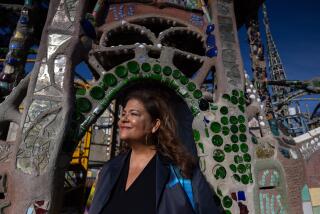Marjory S. Douglas, 108; Author Dubbed Everglades ‘River of Grass’
- Share via
MIAMI — Marjory Stoneman Douglas, who became the grand dame of the American environmental movement after her book on what she termed “the river of grass” led to the creation of Everglades National Park, died Thursday at her home in Miami. She was 108.
Colorful, opinionated and outspoken, Douglas was an early suffragette, a feminist well before the word was even coined. A 1912 graduate of Wellesley College, she cut a determined swath through the 20th century while defining the very essence of a modern woman.
“She was intensely curious about events, and wanted to see what would happen,” said Miami lawyer William T. Muir, a lifelong friend, in trying to explain Douglas’ longevity. “Moreover, she wanted to participate.”
Although blind and virtually bedridden for several years, Douglas until recently continued to maintain a lively friendship with a small circle of people who dropped in to visit her in the thatched-roof cottage in the Coconut Grove section of Miami where she had lived alone since 1926.
Though she gained renown as an environmentalist, Douglas did not even set foot in the Everglades until she was well into middle age, when, in 1947, a publisher asked her to write a book in a series on American rivers. Rejecting the Miami River as too short to be the subject of a book, Douglas looked instead at the Everglades, and where others saw a swampy impediment to expanding civilization, she saw a vast river, 50 miles wide and just six inches deep.
“There are no other Everglades in the world,” begins Douglas’ graceful, insightful work, “The Everglades,” which became a surprise bestseller and still sells about 10,000 copies a year in paperback.
In 1948, a year after the book’s publication, 1.6 million acres of marshland west of Miami was designated Everglades National Park.
“She was larger than life, and she leaves a brilliant legacy,” said Joette Lorion, president of Friends of the Everglades, which Douglas founded at 78 and served as president of until she was 101. “She inspired a nation to change the way they think about the Everglades.”
Although the book forever linked her to the Everglades, and she fought vigorously for laws to protect it, Douglas rarely went to the marshy saw grass prairie except to be photographed, always in her trademark wide-brimmed hat. “It’s too buggy, too wet, too generally inhospitable,” she wrote. “I know it’s out there and I know it’s important. I suppose you could say that the Everglades and I have the kind of friendship that doesn’t depend on physical contact.”
In November 1993, at the age of 103, Douglas traveled to Washington to receive the Medal of Freedom from President Clinton. The following year a book Douglas wrote for children, “Freedom River,” was reissued after being out of print for 21 years, and she sent a copy to the Clintons’ daughter, Chelsea.
The Clinton administration has made Everglades restoration a focus of its environmental policy. The massive project to restore the natural flow of fresh water through the heart of Florida is expected to cost up to $5 billion and take decades to complete.
Douglas was honored with many conservation awards, along with schools, parks and environmental laws that bear her name. A high-rise office building in Tallahassee that includes the Department of Natural Resources is named after her.
Marjory Stoneman was born in Minnesota on April 7, 1890, during the administration of Benjamin Harrison. She was raised by her mother in Massachusetts.
She was married briefly to Kenneth Douglas, a man 30 years her senior, and when the marriage failed, she joined her father in Miami, where he had founded the Miami Herald.
After a short stint as a society columnist, Douglas went to Paris during World War I to serve with the Red Cross. When she returned to the U.S., she took up a career as a freelance journalist.
Even as she grew more infirm with age, her mental acuity was unwavering, and until recently she continued to work on a biography of an obscure 19th-century English writer and to brush up on her French. When her eyesight failed, she grew dependent on taped books and friends who would read to her.
Douglas was not a religious person, writing in her autobiography that she did not believe in an afterlife, or a need for one. “I believe life should be lived so vividly and intensely,” she said, “that thoughts of another life, or of a longer life, are not necessary.”
Douglas leaves no surviving relatives.
At her request, she is to be cremated and her ashes scattered over Everglades National Park.
Times researcher Anna M. Virtue in Miami contributed to this story.
More to Read
Sign up for our Book Club newsletter
Get the latest news, events and more from the Los Angeles Times Book Club, and help us get L.A. reading and talking.
You may occasionally receive promotional content from the Los Angeles Times.






